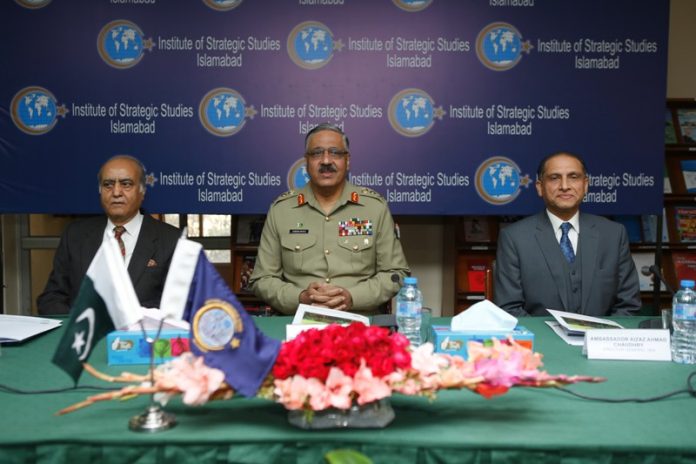Press Release
Seminar
on
Understanding Strategic Coercion in the Realm of Hybrid Gray Conflict:
Implications for Pakistan
February 11, 2019
“Beginning as early as the Partition, coercive statecraft and hostility from our neighbor is not new, however, with the accession of hyper-nationalist elements, this attitude has become more aggressive. We have taken the right direction and strengthened our defense. With China-Pakistan Economic Corridor (CPEC) and the evolving dynamics of SCO, we are all set to play an important role. We succeeded in the past, we’ll succeed in the future. We continue to build our Minimum Credible Deterrence. A Nuclear power of 220 million cannot be coerced.” This was stated by Gen. Zubair Mahmood Hayat NI (M), Joint Chiefs of Staff Committee at the seminar on Understanding Strategic Coercion in the Realm of Hybrid Gray Conflict: Implications for Pakistan organized by the Institute of Strategic Studies Islamabad (ISSI) on February 11, 2019.The speakers at the seminar were Mr. Leonid Savin, geopolitical analyst, Russia; Mr. Ikram Sehgal, defense and security analyst; Lt. Gen. (Retd) Naeem Khalid Lodhi HI (M), former Defense Secretary. The event was attended by politicians, ambassadors, academicians, journalists and students.
Gen. Zubair said that in the prevailing international environment, this subject is of great relevance and interests to Pakistan. The country has been enduring a subtle and, at times, not so subtle strategic coercion. It is not just Pakistan, he added, but the entire region that is subject to the strategic coercion: the South Asian Association of Regional Cooperation (SAARC) has become a hostage to this unfortunate phenomenon. This is undermining regional strategic calculus and negatively affecting the internal politics as well. Tehreek-i-Taliban Pakistan (TTP), Baloch nationalist and the arrest of KalbhushanYadev are all manifestation of this evolving challenge. To ward off the spectre of strategic coercion in the realm of hybrid warfare, new methods and modalities are required. We have taken the direction and come a long way in establishing and strengthening our defense. We fought off the scourge of terrorism, not only physically, but emotionally and psychologically as well. We are engaging the important world capitals and Muslim countries. We have succeeded in the past, we’ll succeed in the future as well.
Earlier in his welcome remarks, Director General ISSI, Ambassador Aizaz Chaudhry elaborated on the evolving nature of strategic warfare and shed light on how fourth generation warfare has taken hold of the international politics. Deliberating on whether strategic coercion is real or just a perception, Ambassador stated that it is as real as presence in the hall. Citing Pakistan’s sacrifices and painstaking efforts in the War on Terror (WoT), he lamented that not everyone is happy with the country’s achievements. He raised some important questions as to why anyone should target Pakistan and how should we tackle this perplexing issue?
The Russian analyst, Mr. Leonid Savin delved on Identifying Doctrines and the Nature of Gray Hybrid Threats in the 21stCentury. He began by saying that the very term, Gray Hybrid Conflict, is a western construct and we need to come up with our own narrative. Mr. Leonid emphasized that we must look at this issue from the perspective of changing geostrategic challenges in the international arena. Before 2014, Hybrid warfare was discussed mostly in military affairs but, after the Ukraine crisis, it has expanded to the political domain as well. The analyst suggested that a Special Task Force is required to tackle this challenge.
Mr. Ikram Sehgal, Defense and Security Analyst, spoke on Strategic Coercion in the Age of Hybrid Conflict: Adversaries and Challenges in South Asia. He described hybrid warfare as a mix of all the linear and non-linear, kinetic and non-kinetic warfare. All of its components are inter-connected, applied simultaneously and adopted likewise in time and space. Propaganda, social implosion, and cyber warfare are some of its expressions. Suggesting how this challenge can be countered, Mr. Sehgal proposed a two-pronged strategy: taking benefits from the military’s experienced servicemen and making proper geopolitical assessment of hybrid warfare threats.
Lt. Gen. Naeem Khalid Lodhi HI (M), former Defense Secretary, offered an in-depth analysis on the topic of Pakistan and Hybrid Conflict: Vulnerabilities, Capabilities and Policy Responses. He introduced Hybrid warfare as an acme of strategy to win a battle without fighting. He said that it is unleashed to impact worldviews, politics, culture, , faith, social bonds and economy. He proposed that a combination of “Detection (fact finding), Reaction (to tolerate or fight back), Mechanism (offensive or defensive), Whole Nation Effort (led by apex political entity)” can prove highly productive in this deceptive warfare.
In his concluding remarks, Chairman ISSI, Ambassador Khalid Mahmood said that the concept of Hybrid warfare is not new. It goes back as early as 500 BC, the times of a famous Chinese strategist, Sun Tzu. Often, the objectives of Hybrid warfare is not to defeat the enemy immediately but to demoralize, erode social and political cohesion, and create internal chaos. He said that the fundamental aspects of Gray Hybrid Conflict necessitate the transformation of current security approaches and war-fighting strategies of Pakistan.












